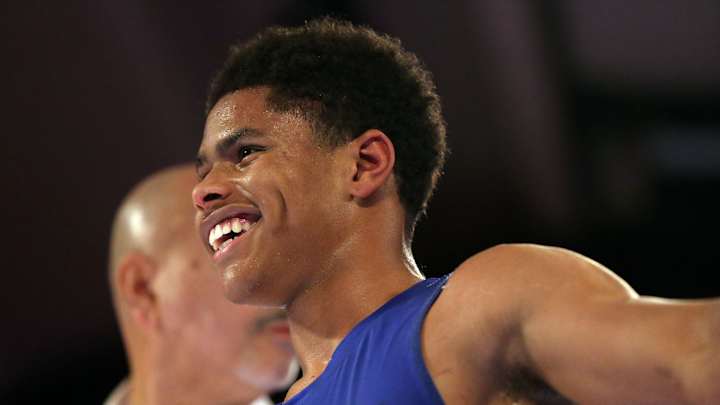US boxer Shakur Stevenson chases childhood dream to Olympics

COLORADO SPRINGS, Colo. (AP) Shakur Stevenson started throwing punches shortly after he could walk. His grandfather began teaching him how to box at age 5, and he has barely lost since he won his first fight at 8.
He dreams of world title belts and enough money to move his mother and eight younger siblings out of his beloved Newark, New Jersey. But first, Stevenson is in Rio de Janeiro to fulfill a dream that has consumed him since he went online and looked up the early history of his favorite boxer, Andre Ward.
''Most people say they want to become a world champion, but he's actually been obsessed and wanting to win a gold medal his entire boxing career,'' said his grandfather, Wali Moses. ''And now that he's reached the epitome of his career and a gold medal is right here, I think he's starting to roll toward it. The climb has been hard, but he wants it.''
Stevenson doesn't flinch from the weight on his shoulders heading into the Olympics as the brightest candidate to win the first men's gold medal in 12 years from once-proud USA Boxing.
Ward was the last American man to claim the top prize with his brilliant performance in Athens, and the London men's team failed to win any medals at all for the nation that still leads the world in Olympic golds and total medals.
With his speed, skill and unbeaten record in international competition, Stevenson has all the makings of an Olympic champion. A lucrative professional career awaits him in the fall, but the 19-year-old has spent his entire youth focused on the Olympic 123-pound tournament, which begins Aug. 10.
''I don't feel I've really proved myself yet,'' Stevenson said. ''I'd rather go to Rio first and win a gold medal, and then everybody can talk about me. When it comes down to it, it doesn't matter what anybody else thinks. I don't focus on everybody hyping me up. It's just me getting in that ring and fighting.''
Stevenson's mother, Malikah, named him after Tupac Shakur, the rapper and social activist who died nine months before her first son was born. Stevenson mostly avoided trouble on Newark's tough streets, and his grandfather's steady influence kept him devoted to his sport.
Moses vividly remembers the first time he saw his 2-year-old grandson throwing hands.
''We were watching Tuesday night fights, and he just started punching,'' Moses said with a laugh. ''Every time I took him to a tournament, even before he was old enough to fight, he would always say, `Pop-Pop, I'm never going to lose.' He's always had that attitude. He's just totally dedicated himself to the sport of boxing. Ever since then, each achievement, I knew something special was going on.''
Stevenson soon developed a compulsive habit of shadowboxing at every spare moment, although he acknowledges that it can be unnerving to the other people waiting in lines at cafeterias or airports.
Stevenson has been capable of boxing 12 hard rounds since he was 10 years old, and he grew into a powerhouse under the tutelage of Moses and Kay Koroma, now the associate coach of the Olympic team. He even attracted the attention of Virgil Hill, the 1984 U.S. Olympian who became a light heavyweight world champion.
''Virg told him that he's the closest thing he's seen to Pernell Whitaker,'' Moses said of the 1984 gold medal-winning lightweight. ''That really gave him a boost, a vote of confidence. Since then, he's been winning everything. He's put himself in position to be one of the top boxers in the world.''
Promoters know it, too. Stevenson has been surrounded by attention from people hoping to guide his career to stardom - and some wouldn't have minded if he skipped the Olympics entirely.
He couldn't stop when he's so close to his dream, although he's looking forward to ending the world travels necessary to compete for the International Boxing Association (AIBA).
''It makes me appreciate more of what I've got,'' Stevenson said of his trips to Venezuela, Azerbaijan, Bulgaria, Ukraine and other out-of-the-way locales typically chosen for AIBA tournaments. ''I came from nothing, but I still had something still, because there's a lot of people out in the world that really got nothing. To be honest, I hate traveling, though. I wish we could just teleport to certain places.''
Stevenson realizes he fights in a brutal division of the Olympic-style sport. The bantamweight field in Rio includes Irish world champion Michael Conlan, London flyweight gold medalist Robeisy Ramirez of Cuba and a lengthy list of tested international fighters.
He realizes that's much the same situation faced 12 years ago by Ward, another serious American talent who charged through an Olympic field to win gold.
''I want to start my career how (Ward) started,'' Stevenson said. ''The main thing I'm looking forward to after Rio is getting off the plane and going to Newark. Seeing all the people and how they feel about me coming back with a gold medal, I can't wait for that moment.''
